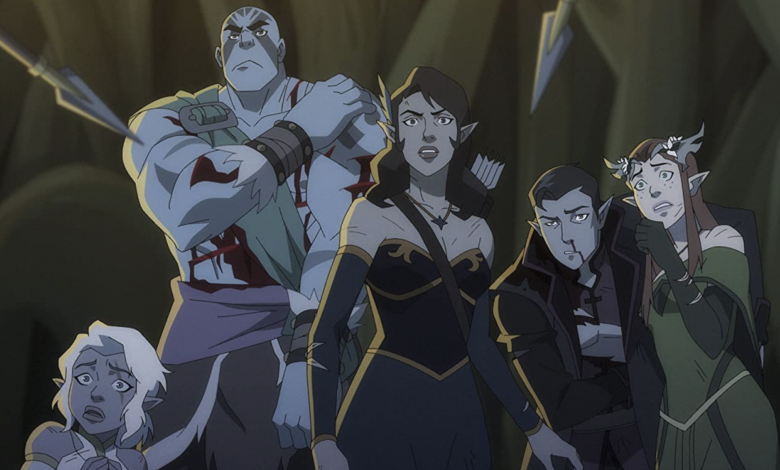The Legend of Vox Machina: Review

Tanner McEveety ‘22 / Emertainment Monthly Staff Writer
The path to The Legend of Vox Machina releasing as a full length series on Amazon Prime Video began in 2019, with a relatively small kickstarter from the folks at Critical Role. They asked for $750,000 for an animated special featuring the characters from Critical Role, their livestreamed Dungeons and Dragons campaign. When fans gave them over $11 million instead, they decided to produce a full TV season. Eventually, Amazon took notice of the hype surrounding the series, picking the show up and immediately ordering the production of a second season.
Needless to say, living up to the expectations of their huge, passionate fanbase was sure to be a difficult task. But with this first season, Critical Role and the team at Titmouse, Inc. have managed it. Though the animation can’t quite hold a candle to Netflix’s Castlevania, nor can the writing surpass Netflix’s Arcane, The Legend of Vox Machina is exactly as good as it needed to be.
The show begins with two episodes focusing on a storyline from before Critical Role became a livestream, back when it was just an ordinary Dungeons and Dragons campaign played by a group of voice actors. The storyline serves as an introduction to the titular band of mercenaries and the fantasy world where they reside, but there’s so much to introduce that it ends up feeling rushed. By the time the audience is meant to be cheering for Vox Machina, a viewer who doesn’t already know them from Critical Role will still be figuring out who’s who.
Luckily, from episode three onward, the show picks up significantly with the introduction of two villains: the Briarwoods, Sylas (Matthew Mercer) and Delilah (Grey Griffin). The “Briarwood Arc,” as fans call it, is one of the most popular sections of the first campaign of Critical Role, and the rest of the season is focused entirely on bringing it to life. With a little bit more room to breathe and truly harrowing villains putting everything into perspective, the characters are able to really shine. By the time the final battle rolls around, the show conjures the swelling emotion that it was unable to at the end of the second episode. Fans of the original livestream will be satisfied with how the writing carries the spirit of the original storyline while also making changes wherever necessary for a better final product.
However, though the writing is good, the voice acting is even better, which isn’t surprising for a project with eight voice actors who also serve in executive producer roles. The main cast are all incredibly familiar with their character, having originally created and roleplayed as them for hundreds of hours, and it pays off. For example, Grog Strongjaw (Travis Willingham) slides naturally and quickly from lovable, honest stupidity to blistering rage, and Keyleth (Marisha Ray) is bubbly, good-hearted, and most prominently, insecure, making it thrilling to watch her succeed.
Meanwhile, the twins, Vex’ahlia (Laura Bailey) and Vax’ildan (Liam O’Brien), give the most consistent performance out of everyone, instilling the series with a firm, edgy, emotional heart. On the other hand, Pike Trickfoot (Ashley Johnson) is emotionally available without the edge, and serves as the team’s moral center without ever coming across as a stick in the mud. Her polar opposite, Scanlan Shorthalt (Sam Riegel), is as alive with pizazz and charisma as he ever was in the livestream, songs included. Although, without Riegel’s subtle, out-of-character winks, some viewers might find his propensity for flirting and sex jokes to be a little much.
Finally, there’s Percy De Rolo (Taliesin Jaffe), the closest thing this season has to a single main protagonist. Aloof, closed-off, intense, and utterly damaged, Jaffe captures Percy’s soul and inner conflict even better than he did in the original campaign. Also, thanks in part to Jaffe’s improvised brilliance during that campaign, Percy gets some of the best lines in the show, and Jaffe doesn’t let them go to waste, absolutely devouring the scenery.
But the good voice acting doesn’t end with the main cast, since they’ve snagged a number of huge names to play the other characters that fill the world. The performances are great across the board, but a few standouts include General Kreeg (David Tennant), Archibald Desnay (Dominic Monaghan), Cassandra De Rolo (Esmé Creed-Miles), and of course, Delilah Briarwood.
Visually, the show varies in quality. Sometimes, it really dips, with stiff, awkward posing or character motion. Plus, while its use of CGI environments is usually quite spectacular, the CGI characters and creatures stick out like sore thumbs among the 2D-animated characters and backgrounds. At other times, the show is gorgeous, with dynamic, moody lighting, fluid, detailed animation, and epic shot compositions. But most of the time, the show is somewhere in between: definitely not bad, but not especially good either.
There are plenty of things to dislike about The Legend of Vox Machina. Much like Castlevania, this is an adult animated series, and it refuses to miss a single opportunity to announce it with sexuality or gore, sometimes to the point of gratuity. The quips and comedy writing, while usually solid, will occasionally feel forced or corny. And fans of the original livestream will find a million little story choices to nitpick across the show’s twelve episodes.
But overall, it’s safe to call The Legend of Vox Machina a victory. It is a must-watch for fans of Critical Role, or even just fans of Dungeons and Dragons. Lovers of fantasy or animation shouldn’t skip it. And even for an audience member completely new to all of that, The Legend of Vox Machina is a highly enjoyable watch. Season 2 can’t come soon enough.